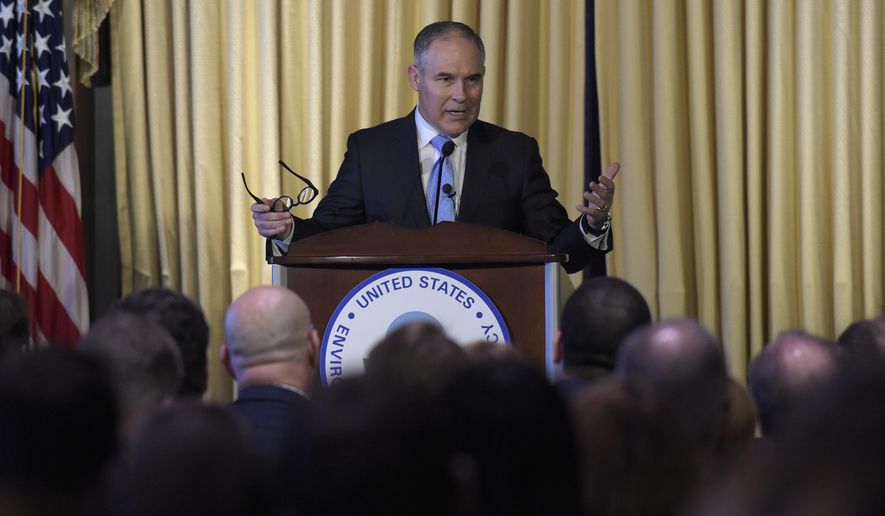Newly installed EPA Administrator Scott Pruitt cultivated a “close and friendly” relationship with oil and gas companies during his tenure as Oklahoma attorney general, a watchdog group charged Wednesday, pointing to documents showing Mr. Pruitt’s office worked hand in hand with fossil fuel companies to fight Obama-era energy regulations.
More than 7,000 pages of emails from the Oklahoma attorney general’s office were made public Wednesday morning following a judge’s order last week.
Democrats and other critics of Mr. Pruitt say the messages prove that the EPA chief frequently colluded with oil and gas firms while Oklahoma’s attorney general, and argue that this raises questions about whether he is fit for his new role.
They also charge that Mr. Pruitt was returning the favor to fossil fuel firms that donated money to his political campaigns and to the Republican Attorneys General Association, which Mr. Pruitt used to head.
“There is no valid legal justification for the emails we received last night not being released prior to Pruitt’s confirmation vote other than to evade public scrutiny,” said Arn Pearson, general counsel for the Center for Media and Democracy, which sued to make the records public.
“There are hundreds of emails between the AG’s office, Devon Energy and other polluters that senators should have been permitted to review prior to their vote to assess Pruitt’s ties to the fossil fuel industry,” he said.
The contacts between Mr. Pruitt and energy firms seem to be in many ways the reverse of what was common practice at the EPA throughout the Obama administration.
Emails released during President Obama’s second term showed close coordination between top EPA officials and leading environmental activist groups that often helped guide agency policy and, in some cases, assisted in the writing of federal regulations.
While Mr. Pruitt’s messages do not appear to contain any smoking guns that could imperil his future, they do contain frequent communication between the Oklahoma attorney general’s office and energy companies, energy industry lobbying groups, and powerful conservative organizations such as Americans for Prosperity.
In one 2013 back-and-forth, Mr. Pruitt’s office seems to work closely with the American Fuel & Petrochemical Manufacturers in an attempt to sink the federal Renewable Fuel Standard, a set of regulations requiring ethanol and other biofuels to be blended with the nation’s gasoline supply.
The AFPM provided Mr. Pruitt’s office with draft language it could use to challenge the standard in court.
“This argument is more credible coming from a state,” an AFPM official said in an email.
Other messages show close coordination between Mr. Pruitt’s office and Devon Energy, an Oklahoma-based energy company. The two sides spoke frequently as they worked on a strategy to oppose federal regulations on hydraulic fracturing, commonly known as fracking.
Mr. Pruitt later sent a letter to the EPA opposing the rules, using language largely written by Devon Energy. The emails show that draft letters were sent back and forth between Devon Energy and the attorney general’s office, with Devon Energy leaders making changes and suggestions.
In one exchange, P. Clayton Eubanks, the deputy solicitor general working for Mr. Pruitt, wrote to Bill Whitsitt, who was Devon Energy’s vice president for public affairs, and asked for input on a letter that ultimately would be sent to the EPA.
“We have received good support on this, and I would like to get the letter out in the morning,” Mr. Eubanks wrote in the May 2013 message. “I thought we should insert a sentence or two regarding the recent EPA report indicating their initial estimates on methane emissions for two categories were too high. Any suggestions?”
Mr. Pruitt has defended his close working relationship with Devon Energy and other oil and gas companies, saying it was his duty to fight on behalf of Oklahoma industries against burdensome federal regulations.
In its own statement Wednesday, Devon Energy said the company often was a “resource” for policymakers.
“We have a clear obligation to our shareholders and others to be involved in these discussions related to job growth, economic growth and domestic energy,” company spokesman John Porretto said in a statement. “It is important that we give full consideration to policymaker requests for information and expertise on industry issues. It would be indefensible for us to not be engaged in these important issues.”
The EPA did not offer comment Wednesday on the email release.
A federal judge is reviewing thousands of additional email records, which could be released soon.
• Ben Wolfgang can be reached at bwolfgang@washingtontimes.com.




Please read our comment policy before commenting.